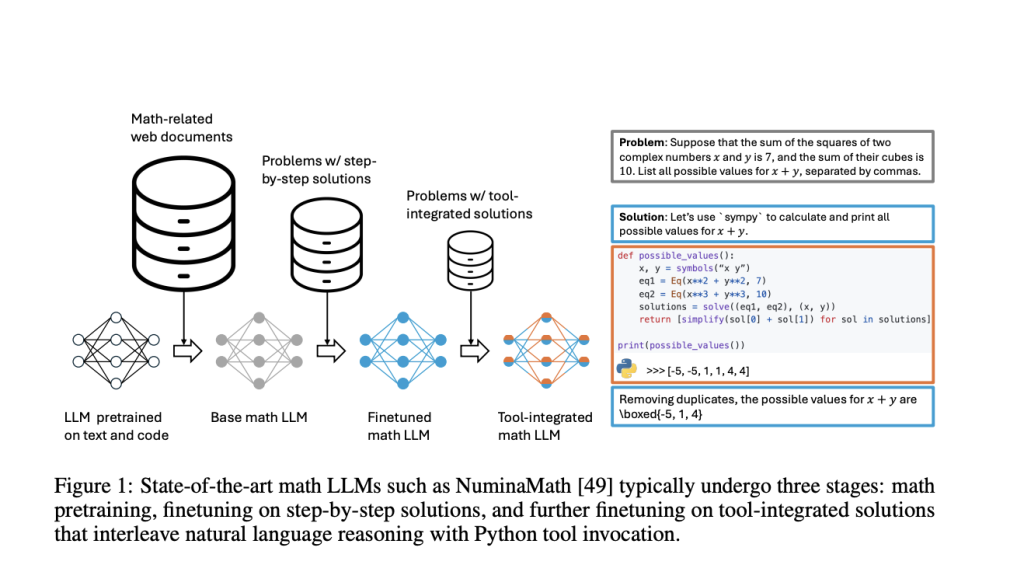

Formal mathematical reasoning represents a significant frontier in artificial intelligence, addressing fundamental logic, computation, and problem-solving challenges. This field focuses on enabling machines to handle abstract mathematical reasoning with precision and rigor, extending AI’s applications in science, engineering, and other quantitative domains. Unlike natural language processing or vision-based AI, this area uniquely combines structured logic with the creative elements of human-like reasoning, holding the promise of transformative advancements.
Despite progress in applying AI to mathematics, significant challenges remain in addressing complex, abstract problems. Many AI models excel in solving high school-level mathematical problems but struggle with advanced tasks such as theorem proving and abstract logical deductions. These challenges are compounded by data scarcity in advanced mathematics and the inherent difficulty of verifying intricate logical reasoning. This has created a critical need for new approaches to bridge these gaps.
Current methods in mathematical AI largely rely on natural language processing to train large language models (LLMs) on informal datasets. These datasets include problems with step-by-step solutions derived from sources like academic papers and online forums. While these approaches have led to successes in standardized benchmarks, they remain limited in addressing abstract and higher-level problems. Informal approaches often generate errors in reasoning and are constrained by the availability of quality data, underscoring the limitations of relying solely on these methods.
Researchers from Meta FAIR, Stanford University, UC Berkeley, the University of Edinburgh, and UT Austin have introduced formal mathematical reasoning as an innovative solution. This approach uses formal systems such as Lean, Coq, and Isabelle to validate mathematical reasoning. These systems enable rigorous verification of theorems and proofs, reducing errors and providing feedback to improve AI capabilities. By grounding reasoning in formal logic, these methods create a robust framework for tackling abstract mathematical challenges while addressing data scarcity and correctness verification issues.
Formal reasoning employs proof assistants to ensure the soundness of mathematical proofs. The methodology combines autoformalization—translating informal mathematics into formal syntax—with reinforcement learning to improve models iteratively. For example, Lean, a widely used proof assistant, allows researchers to validate logical proofs through type checking. The process involves breaking down complex problems into smaller, verifiable sub-goals. Researchers also utilize synthetic data generation, creating extensive datasets from foundational axioms to train and refine AI models. These advancements have enabled the integration of formal verification techniques into advanced mathematical reasoning systems, significantly enhancing their accuracy and robustness.
Formal reasoning systems have delivered remarkable performance improvements. AlphaProof achieved a silver medal-level performance in the International Mathematical Olympiad (IMO) by leveraging formal methods and synthetic data. It formalized over one million IMO-like problems, generating one hundred million formal theorems and corresponding proofs through iterative refinement. Similarly, AlphaGeometry successfully solved complex geometry problems by combining domain-specific systems with symbolic representations. These achievements highlight the capability of formal reasoning to address abstract challenges, surpassing traditional informal methods accurately. Notably, the systems demonstrated superior performance in theorem proving, achieving success rates comparable to experienced human mathematicians in certain domains.
Integrating formal reasoning and artificial intelligence is pivotal in advancing mathematical discovery. Researchers are paving the way for AI systems capable of solving increasingly complex mathematical problems by addressing critical challenges such as data scarcity and logical verification. The efforts led by institutions such as Meta FAIR and their collaborators underscore the transformative potential of combining formal rigor with cutting-edge AI methodologies. This approach enhances AI’s capabilities in mathematics and sets the stage for future innovations across diverse scientific and engineering disciplines.
Check out the Paper. All credit for this research goes to the researchers of this project. Also, don’t forget to follow us on Twitter and join our Telegram Channel and LinkedIn Group. Don’t Forget to join our 60k+ ML SubReddit.
The post This AI Paper Explores How Formal Systems Could Revolutionize Math LLMs appeared first on MarkTechPost.
Source: Read MoreÂ



 Trending: LG AI Research Releases EXAONE 3.5: Three Open-Source Bilingual Frontier AI-level Models Delivering Unmatched Instruction Following and Long Context Understanding for Global Leadership in Generative AI Excellence….
Trending: LG AI Research Releases EXAONE 3.5: Three Open-Source Bilingual Frontier AI-level Models Delivering Unmatched Instruction Following and Long Context Understanding for Global Leadership in Generative AI Excellence….